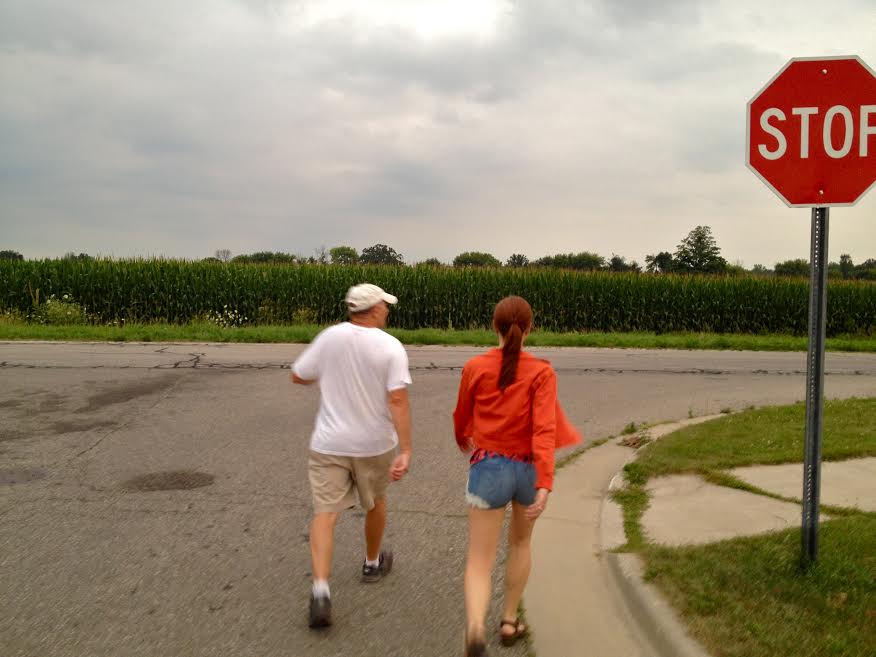
John and I have gone for frequent evening walks for most of our 14-year marriage.
When we were newlyweds, our neighbors across the street often went for night walks, and soon we were passing them on the street pretty regularly.
More recently we added morning walks to our routine. Depending on the weather and the time we have, we might take an ambitious 45-minute brisk walk or we might cut it shorter.
So I was happy to see a recent New Yorker article headlined, “Why Walking Helps Us Think.” Ferris Jabr wrote:
What is it about walking, in particular, that makes it so amenable to thinking and writing? The answer begins with changes to our chemistry. When we go for a walk, the heart pumps faster, circulating more blood and oxygen not just to the muscles but to all the organs—including the brain. Many experiments have shown that after or during exercise, even very mild exertion, people perform better on tests of memory and attention. Walking on a regular basis also promotes new connections between brain cells, staves off the usual withering of brain tissue that comes with age, increases the volume of the hippocampus (a brain region crucial for memory), and elevates levels of molecules that both stimulate the growth of new neurons and transmit messages between them.
The way we move our bodies further changes the nature of our thoughts, and vice versa. Psychologists who specialize in exercise music have quantified what many of us already know: listening to songs with high tempos motivates us to run faster, and the swifter we move, the quicker we prefer our music. Likewise, when drivers hear loud, fast music, they unconsciously step a bit harder on the gas pedal. Walking at our own pace creates an unadulterated feedback loop between the rhythm of our bodies and our mental state that we cannot experience as easily when we’re jogging at the gym, steering a car, biking, or during any other kind of locomotion. When we stroll, the pace of our feet naturally vacillates with our moods and the cadence of our inner speech; at the same time, we can actively change the pace of our thoughts by deliberately walking more briskly or by slowing down.
Because we don’t have to devote much conscious effort to the act of walking, our attention is free to wander—to overlay the world before us with a parade of images from the mind’s theatre. This is precisely the kind of mental state that studies have linked to innovative ideas and strokes of insight.
That connected to Daniel J. Levitin’s recent New York Times op-ed, “Hit the Reset Button in Your Brain.” He wrote this about daydreaming:
This brain state, marked by the flow of connections among disparate ideas and thoughts, is responsible for our moments of greatest creativity and insight, when we’re able to solve problems that previously seemed unsolvable. You might be going for a walk or grocery shopping or doing something that doesn’t require sustained attention and suddenly — boom — the answer to a problem that had been vexing you suddenly appears. This is the mind-wandering mode, making connections among things that we didn’t previously see as connected.
I’ve given our twice-daily walks credit for helping peel off extra pounds, and I like that John and I often use our walks as conversation time, catching up on what happened that day or plans we’re making. But we also observe what’s happening around us and enjoy some quiet thinking time, so maybe we’re helping our brains, too.
If you need inspiration to lace up your walking shoes, read “Why Walking Helps Us Think.”
John and I walk in the heat of summer and the cold and snow of winter:
Related blog posts:

6 Comments
HIPOLITO GAGNI
Wow, your article on walking and the two accompanying pieces about walking and daydreaming has given me the resolve to lace up my shoes, (they have been gathering dust) and do some thinking … Thanks for waking me up
Colleen Newvine Tebeau
Glad to hear I could inspire you to get out for a walk. Let me know how it goes?
Tony
Wonderful post. I think walking is the Cinderella of the exercise world. Considering reblogging you as I have just posted on walking, too.
Tony
Reblogged this on One Regular Guy Writing about Food, Exercise and Living Longer and commented:
Consider this lovely post an additional chapter on my yesterday entry How good is walking for you?
Colleen Newvine Tebeau
Thanks so much, Tony. I’m glad I could help advance the conversation you’d already started about walking.
We’re going to the gym three times a week, and I do think it does me good to work up a sweat, but those twice-a-day strolls are invaluable for body and mind.
Leave a reply